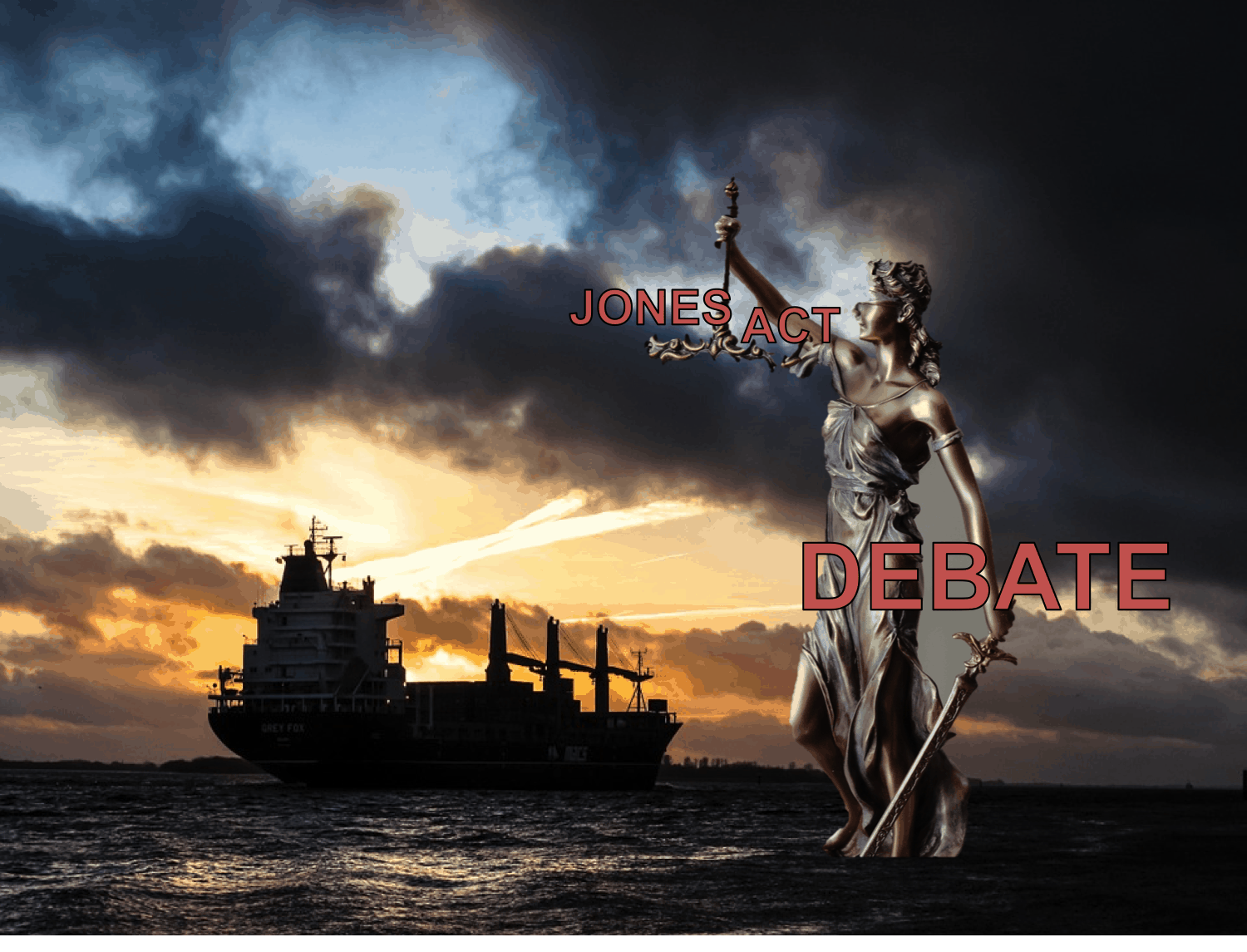The Jones Act Debate Part 1: National Security
The Jones Act, or Merchant Marine Act of 1920, is a hotly debated piece of legislation. Our last blog post got into exactly what the Jones Act is and what it does after President Biden reaffirmed his support for the act that requires ships transporting goods between U.S. ports to be U.S. built, owned, and manned. This follow-up blog series shares arguments for and against the Jones Act.

The goal of this post is not to actually argue for or against the Jones Act, but give U.S. shippers, and anyone else who is interested, an overview of the debate on a piece of legislation that greatly impacts the U.S. shipping industry. However, we’d love to hear your opinions on the Jones Act, and you can share them in the comment section of this post.
Because this is an article about a debate, it will quote more opinion and editorial pieces than regular readers of Universal Cargo’s blog would be accustomed to seeing in our posts. With that being said, let’s get into one of the biggest talking points when it comes whether or not the Merchant Marine Act of 1920 should be repealed or reformed: national security.
Proponents Say Jones Act is Needed for National Security
Those in favor of the Jones Act argue that it is essential for U.S. security. There are two main arguments to the security aspect of the Jones Act.
The first argument is that the Jones Act supports a U.S.-based merchant marine. Without the the Jones Act, the argument goes, the U.S. would be dependent on foreign ships and crews, none of which can be counted on in the event of war or maritime support for the U.S. military and navy.
The second national security argument is that it would be difficult, costly, and possibly impossible to defend all of the country’s waterways, especially inland waterways, from threats that may be aboard foreign ships if they are allowed to traverse between U.S. ports.
Especially when it comes to the first security argument, U.S. generals and military leaders, whose jobs are based in national security, tend to rank high on the list of supporters of the Jones Act.
One such Jones Act advocate is Retired Rear Admiral Thomas K. Shannon, who wrote an op-ed for the Washington Times that was republished by the American Maritime Partnership. Here’s a chunk of the argument he laid out for why the Jones Act is critical to national security:
“… what opponents almost always fail to understand is the critical importance of the Jones Act for our national security and economic stability.
The very first paragraph of the law states that it “is necessary for the national defense and the development of the domestic and foreign commerce of the United States to have a merchant marine owned and operated as vessels of the United States by citizens of the United States composed of the best-equipped, safest, and most suitable types of vessels constructed in the United States and manned with a trained and efficient citizen personnel.”
As the former commander for the U.S. Navy Military Sealift Command, the importance of the Jones Act and the merchant marine that it supports is obvious. From the First and Second World Wars, to Iraq and Afghanistan, a robust U.S.-flagged maritime capability has been the cornerstone of our nation’s military deployments. To borrow a sports analogy, our military is built for “away games,” and before our Army can march to war, it must sail. In fact, when called into action, our military relies on ships to carry 95 percent of our combat capability to and from the war zone.
Unlike other countries, the United States does not subsidize its commercial shipbuilding capacity with taxpayer dollars. Instead, with the Jones Act, we enable a base maritime capability of U.S.-trained mariners, U.S.-flagged ships, a shipbuilding industrial base and a ship-repair capability. This “American made” capacity has been called our “4th arm of defense,” and it enables our president and Congress to project our combat capabilities as part of the Department of Defense budget every year.
The Jones Act ensures a level of maritime capability for America’s defense that cannot and should not be yielded to foreign nations that may one day be our enemy in war.
While the economic and security benefits of the Jones Act are clear, the law is carefully balanced to ensure certainty of markets for financial investors. U.S.-flagged Jones Act carriers have made significant investments in vessels and terminal upgrades to serve the trade. Undercutting these investments by repealing or waiving the Jones Act erodes stability, reliability and predictability among U.S. commercial operators and unnerves potential investors in new vessels, with adverse and cascading impacts on the entire industry, our wartime capacity and our national security.
The second national security argument is laid out in a pretty streamlined way in an op-ed article of the Hill by George Landrith:
Because of the Jones Act, foreign flagged ships with unknown and unvetted foreign crews cannot deliver goods to New Orleans and then sail up the Mississippi River deep into the American heartland. We would have no way to know if terrorists or other bad actors — maybe Chinese or Russian spies — had infiltrated the crew. Imagine the resources required to protect almost 100,000 miles of inland waterways! How could the U.S. ever hope to have any border security if we make every mile of shoreline on both sides of every inland waterway an entry point? The costs would be staggering.
Rebuttal to National Security Argument
Those who oppose the Jones Act obviously don’t buy into the argument that it is in any way essential to America’s national security. The main counter Jones Act opponents make to the argument that the legislation supports a merchant marine that can be called upon to support wartime and overseas operations is that merchant marine is not actually called upon for such support and is not large enough to accomplish this purpose anyway.
During a panel on reforming or repealing the Jones Act put together by the Heritage Foundation, which advocates repealing the Jones Act, Chairman and CEO of NTELX and former member of the U.S. Federal Maritime Commission (FMC) made this argument:
If there’s any, any issue you could think of on which the assertions of the people who support it are completely and patently provably wrong, this is the one law that you could find. There is no other law on which there is so much agreement by everyone but the people who benefit, and it’s a very small set of people. It’s basically three shipyards who have built 40 ships only because the law requires people buy them–to buy them from these yards, of which 30 were oil tankers or product tankers. We have dropped almost nothing in terms of sailors to sail the ships that might be there if they were, but they’re not. The jones act fleet is virtually non-existent and doesn’t actually go into war.
the factors here that ships cost too much it costs three to five times as much to build a ship here in the United States is anywhere else it’s not because our labor is better it’s not because our laws are tougher on technology or anything else or safety it’s purely because we don’t build enough ships and don’t have enough demand that’s big ships among small ships we’re basically a global leader our barge yards push out 4,000 ships a year very competitive lots of competitors our small boats and tenders and all those have lots of competitors but not in the ships that we think of as national security
As for the second argument of securing ports against threats that may be concealed in foreign flagged and manned vessels, the general counter argument is that foreign ships arrive at U.S. ports every day. It wouldn’t really make any difference, say those for repealing the act, if we allowed those foreign ships to take goods from one port to another.
The Jones Act Debate Continues
Since this legislation is still being debated over a hundred years after going into effect, it shouldn’t be a problem continuing this discussion about that debate in later blog entries. This Jones Act series will continue, getting into protectionism, costs, and Puerto Rico.




